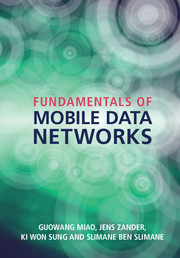Book contents
- Frontmatter
- Contents
- Preface
- Acronyms
- Notations
- 1 Introduction
- 2 Wireless network models
- 3 Medium access control
- 4 Scheduling
- 5 Principles of cellular systems
- 6 Transmitter power control
- 7 Interference management
- 8 Association and handover
- 9 Energy-efficient design
- 10 Long term evolution
- 11 Wireless infrastructure economics
- About the authors
- Index
- References
4 - Scheduling
Published online by Cambridge University Press: 05 March 2016
- Frontmatter
- Contents
- Preface
- Acronyms
- Notations
- 1 Introduction
- 2 Wireless network models
- 3 Medium access control
- 4 Scheduling
- 5 Principles of cellular systems
- 6 Transmitter power control
- 7 Interference management
- 8 Association and handover
- 9 Energy-efficient design
- 10 Long term evolution
- 11 Wireless infrastructure economics
- About the authors
- Index
- References
Summary
Introduction
Wireless communications are evolving from analog, small-capacity, voice services to digital, large-capacity, data services. Nowadays wireless systems should be designed to accommodate many new requirements. For example, wireless networks should be capable of providing high data rates so that terminals can receive broadband services with fast response times. Wireless networks should also have a flexible service architecture to integrate different types of services on a single air interface because terminals have different service requirements. If the network is optimized only for one type of service, other types will experience poor service quality. On top of the flexible service architecture, effective QoS management schemes are also needed. This is because QoS metrics differ among different applications that may even be of the same type. For example, all video telephony has a strict delay requirement but the detailed parameters can be different. When different resolutions of videos are used, the delay requirements of sending each packet would also differ, as would the rate requirements.
The requirements of all terminals can be met easily if there are unlimited wireless resources, e.g. infinite spectrum, infinite transmission power and unlimited antennas, such that each terminal can be allocated whatever resources it desires. In practice this is impossible because of various limitations. The spectrum is allocated by the government and is very limited. Technically it is also difficult to implement devices that support communications over infinite spectrum. The RF transmission power should not exceed government regulations. It is impossible to implement power amplifiers that support infinite power output. In addition there is also the concern of high energy bills. Because of the limits of device dimensions, it is also impossible to use an infinite number of antennas in wireless communications. Therefore, wireless resources need to be shared among all terminals carefully and it is desirable to schedule the usage of wireless resources as efficiently as possible, while maximizing the overall network performance. For example, spectrum bandwidth is a key resource carrying wireless signals and determines the maximum symbol transmission rate. With FDMA, the amount of bandwidth allocated to each terminal limits its channel access rate. In other words, the bandwidth allocation determines the transmission opportunity of each terminal. Similarly, time slots in TDMA and codes in CDMA are all resources that should be scheduled efficiently.
Information
- Type
- Chapter
- Information
- Fundamentals of Mobile Data Networks , pp. 65 - 94Publisher: Cambridge University PressPrint publication year: 2016
References
Accessibility standard: Unknown
Why this information is here
This section outlines the accessibility features of this content - including support for screen readers, full keyboard navigation and high-contrast display options. This may not be relevant for you.Accessibility Information
- 3
- Cited by
